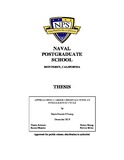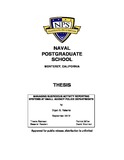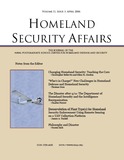Approaching career criminals with an intelligence cycle
| dc.contributor.advisor | Morag, Nadav | |
| dc.contributor.author | O’Leary, Denis Francis | |
| dc.date | Dec-15 | |
| dc.date.accessioned | 2016-02-17T18:37:56Z | |
| dc.date.available | 2016-02-17T18:37:56Z | |
| dc.date.issued | 2015-12 | |
| dc.identifier.uri | https://hdl.handle.net/10945/47834 | |
| dc.description.abstract | Career criminals have been responsible for a high number of crimes out of proportion to their small numbers. Efforts to reduce the recidivism rate through intervention programs have not been effective. American law enforcement could be more effective if career criminals were targeted for special attention. Many law enforcement formats, such as community policing, problem-oriented policing and intelligence-led policing, are currently in use by American state, local, and tribal law enforcement agencies, and applying the use of intelligence practices to crime in these communities has become a focus of its law enforcement agencies. Can American law enforcement agencies use an intelligence community tool—the intelligence cycle—to deal with career criminals effectively? This thesis studies serious-offender programs and the use of the intelligence cycle by American intelligence agencies in order to create a model merging serious offender programs and intelligence cycles. It investigates serious-offender programs and finds that a lack of focus limited the use of the intelligence cycle within the American criminal justice system. This thesis concludes that the use of the intelligence cycle—specifically the FBI’s intelligence cycle’s six steps of requirements, planning and direction, collection, processing and exploitation, analysis and production, and dissemination—can assist a law enforcement agency in focusing its efforts on career criminals. | en_US |
| dc.description.uri | http://archive.org/details/approachingcaree1094547834 | |
| dc.publisher | Monterey, California: Naval Postgraduate School | en_US |
| dc.rights | Copyright is reserved by the copyright owner. | en_US |
| dc.title | Approaching career criminals with an intelligence cycle | en_US |
| dc.type | Thesis | en_US |
| dc.contributor.secondreader | Miller, Patrick | |
| dc.contributor.department | National Security Affairs | |
| dc.contributor.department | National Security Affairs | en_US |
| dc.subject.author | career criminal | en_US |
| dc.subject.author | habitual offender | en_US |
| dc.subject.author | habitual serious and violent juvenile offender programs | en_US |
| dc.subject.author | repeat offender programs | en_US |
| dc.subject.author | intelligence | en_US |
| dc.subject.author | intelligence cycle | en_US |
| dc.subject.author | recidivism | en_US |
| dc.description.service | Captain, San Francisco Police Department (Retired), San Francisco, CA | en_US |
| etd.thesisdegree.name | Master of Arts in Security Studies (Homeland Security and Defense) | en_US |
| etd.thesisdegree.level | Masters | en_US |
| etd.thesisdegree.discipline | Security Studies (Homeland Security and Defense) | en_US |
| etd.thesisdegree.grantor | Naval Postgraduate School | en_US |
| dc.description.distributionstatement | Approved for public release; distribution is unlimited. |
Files in this item
This item appears in the following Collection(s)
-
1. Thesis and Dissertation Collection, all items
Publicly releasable NPS Theses, Dissertations, MBA Professional Reports, Joint Applied Projects, Systems Engineering Project Reports and other NPS degree-earning written works.





